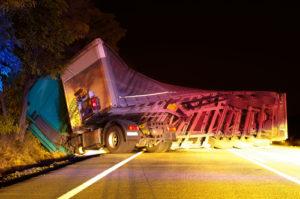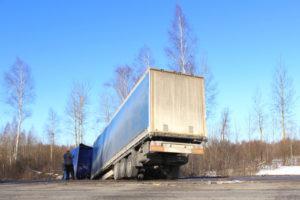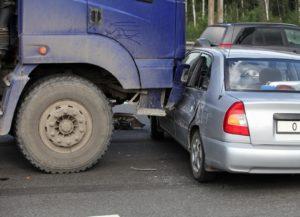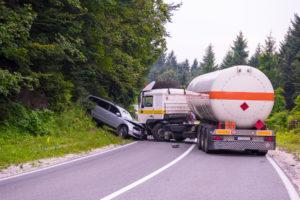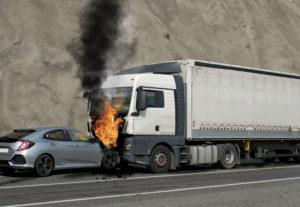
Truck accidents do not frequently go to court. While estimates vary, a 2016 New York Law School study found that only 7% of civil court actions involved tort cases. Personal injury law, which covers truck accidents, is a category of tort case.
Why Is It Beneficial That Lawsuits Are Infrequent After Truck Accidents?
Lawyers and insurance companies do their best to avoid lawsuits. Lawsuits have several drawbacks, including:
- Large time commitments
- High legal costs
- Adversarial nature
For these reasons, your lawyer or insurer will likely advise against filing an immediate lawsuit. Insurance claims allow truck accident victims to avoid lawsuits while still receiving a settlement.
For a free legal consultation, call (614) 538-1116
Truck Accident Insurance Claims
The Federal Motor Carriers Safety Administration (FMCSA) mandates that all trucking companies require their drivers to carry insurance. The insurance these drivers carry is called liability insurance; this type of insurance can be used to cover the losses of those injured in an accident, provided a trucker or trucking company was at fault.
The presence of trucking liability insurance facilitates the usage of out-of-court settlements and decreases the occurrence of lawsuits after truck accidents. You will need to negotiate with the at-fault party’s insurer to secure a liability insurance claim.
This process is inherently risky. Insurers often work against those they are supposed to support. They may:
- Ask that you provide a recorded statement and use the information you provide against you
- Offer you a low-value settlement
- Suggest that you were at fault and refuse to offer you a settlement
Working with a truck accident lawyer could simplify this process. They can communicate with insurers on your behalf and advise you on what you can or cannot say to insurers. For example, certain statements or phrases could jeopardize the value of your case.
Who Can Be Held Liable After a Truck Accident?
An accident involving a truck does not mean it was caused by a trucker or trucking company. However, these are the parties that could have caused your accident:
- Another driver: Drivers on the roadway are responsible for keeping others safe from harm. Negligent behavior from someone driving a personal vehicle, like speeding, or drunk driving, could have caused your accident.
- A trucking company: Under Ohio Revised Code Section 2307.24, employers can be held responsible for the negligent behavior of their employees. This legal precedent is called vicarious liability and could apply to your trucking accident claim.
- A trucker: Some truckers operate as independent contractors, meaning their employers are shielded from vicarious liability. If an independent contractor caused your accident, you might need to communicate with their insurer to secure a settlement. Keep in mind that the legal frameworks surrounding vicarious liability are complex. Every case will unfold differently, and most rules associated with vicarious liability can be bent in one way or another.
- A truck manufacturer: Truck parts or vehicle manufacturers have a responsibility to produce products that are safe for use. Some truck accidents are caused by unavoidable vehicle malfunctions, like broken taillights or faulty breaks.
How Is Liability Established in a Truck Accident Claim?
Liability is a crucial element of truck accidents. To receive a settlement, you must be able to prove that another party was responsible for your accident and injuries. The first step of this process entails gathering evidence, which could include:
- Witness statements
- The on-board computer of a truck
- Expert testimonials
- Traffic camera footage
This evidence can then be slotted into the four elements of negligence. This legal framework involves establishing four qualifiers that highlight fault, including:
- Duty of care: Every party involved with roadway activities, from manufacturers to truck drivers, has a legal responsibility to keep others from harm.
- Breach of duty: Failure to uphold this duty takes the form of negligence. As noted previously, negligence in a truck accident case can include speeding, driving in an unsafe manner, or purveying unsafe vehicle equipment.
- Causation: The evidence you or your lawyer collects must demonstrate a clear linkage between the at-fault party’s negligence and your accident.
- Damages: Finally, you must demonstrate that you suffered damages from the accident.
This process is time-consuming and complex. A truck accident attorney can work to pursue liability on your behalf. You are entitled to legal representation and assistance throughout your claim.
Click to contact our personal injury lawyers today
What Damages Are Available in a Truck Accident Case?
Truck accident victims can pursue a range of damages. These damages categorize the emotional and financial fallout of a truck accident, including:
- Medical expenses
- Pain and suffering
- Lost wages if your accident prevented you from going to work
- Continuing medical costs, like rehabilitative therapy or assisted living devices
These damages can be augmented if your case involves a wrongful death. Those who have lost a loved one can also pursue:
- Burial expenses
- Funeral expenses
- The loss of a close personal relationship
Complete a Free Case Evaluation form now
Speak with a Truck Accident Lawyer About Your Claim Today
We are ready to support those who have suffered from a truck accident. Our Ohio truck accident attorneys can provide you with a free, no-obligation case review. During this meeting, we can discuss your case details and the likelihood your truck accident case will go to court and advise you on your next steps. No one should have to go it alone after a truck accident. We are not afraid to stand up to insurers on your behalf.
Call Bressman Law to get started today.
Call or text (614) 538-1116 or complete a Free Case Evaluation form


